Corporate Law Case Study: LAW513 Assignment 2 Analysis, 2019
VerifiedAdded on 2022/11/10
|9
|1872
|397
Case Study
AI Summary
This case study analyzes a scenario involving Jones Hardware Pty Ltd, Mrs. Jones (a director), and a bank loan from BNZ. The central issue revolves around whether the bank can enforce its mortgage given Mrs. Jones's fraudulent intentions in obtaining the loan. The analysis considers sections of the Corporations Act 2001 (Cth), particularly those concerning a third party's assumptions when dealing with companies (Section 129) and the duties of directors (Sections 180-184). The case examines whether Mrs. Jones breached her director's duties by misrepresenting the loan's purpose. The bank's actions are assessed based on its reliance on the company's representations and the documents presented. The conclusion determines the bank's ability to enforce the mortgage and whether Mrs. Jones is in breach of her director's duties. The assignment includes references to relevant legislation, case laws and books/journals.
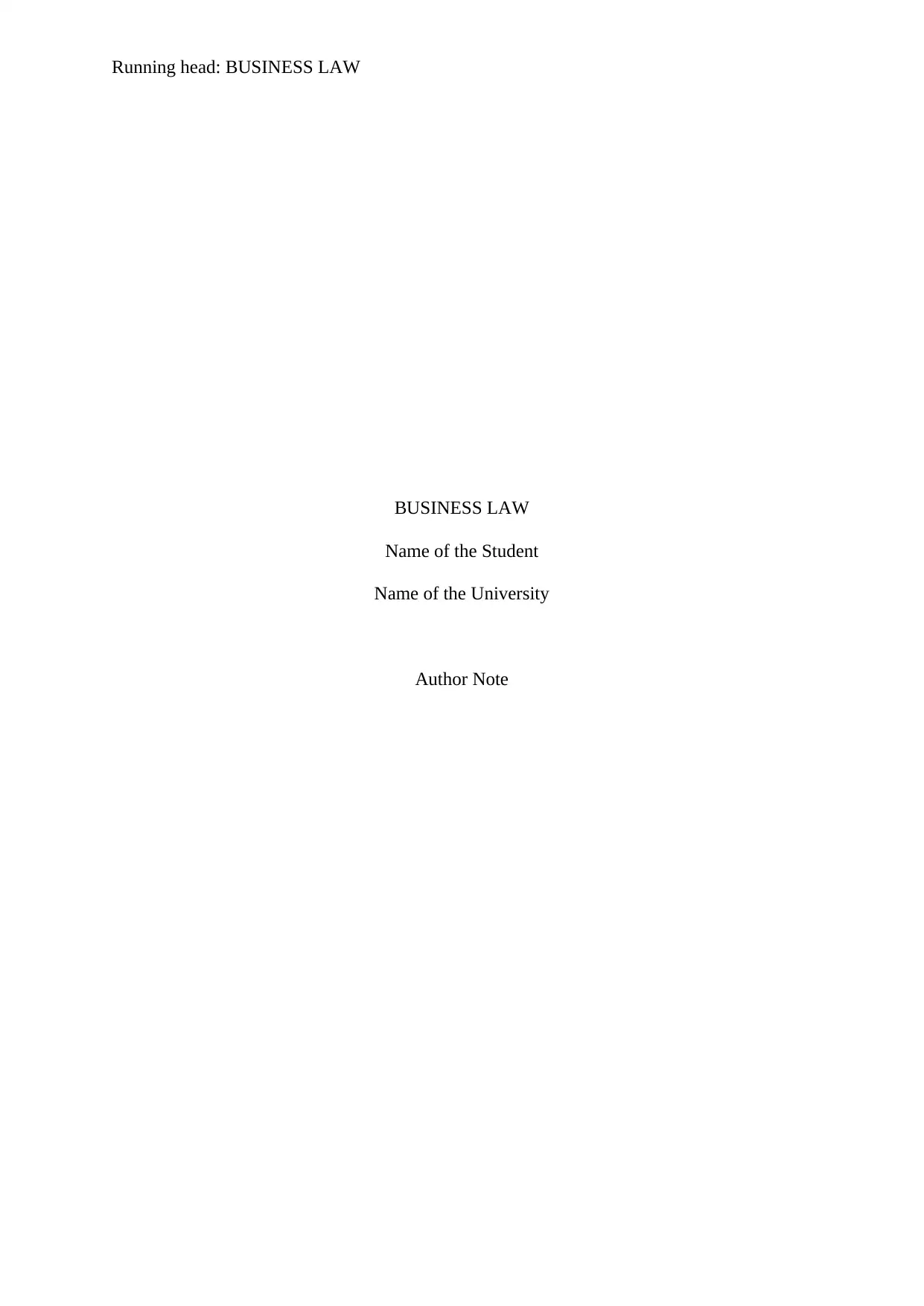
Running head: BUSINESS LAW
BUSINESS LAW
Name of the Student
Name of the University
Author Note
BUSINESS LAW
Name of the Student
Name of the University
Author Note
Paraphrase This Document
Need a fresh take? Get an instant paraphrase of this document with our AI Paraphraser

1BUSINESS LAW
Table of Contents
Question 1......................................................................................................................2
Question 2......................................................................................................................5
References......................................................................................................................7
Table of Contents
Question 1......................................................................................................................2
Question 2......................................................................................................................5
References......................................................................................................................7
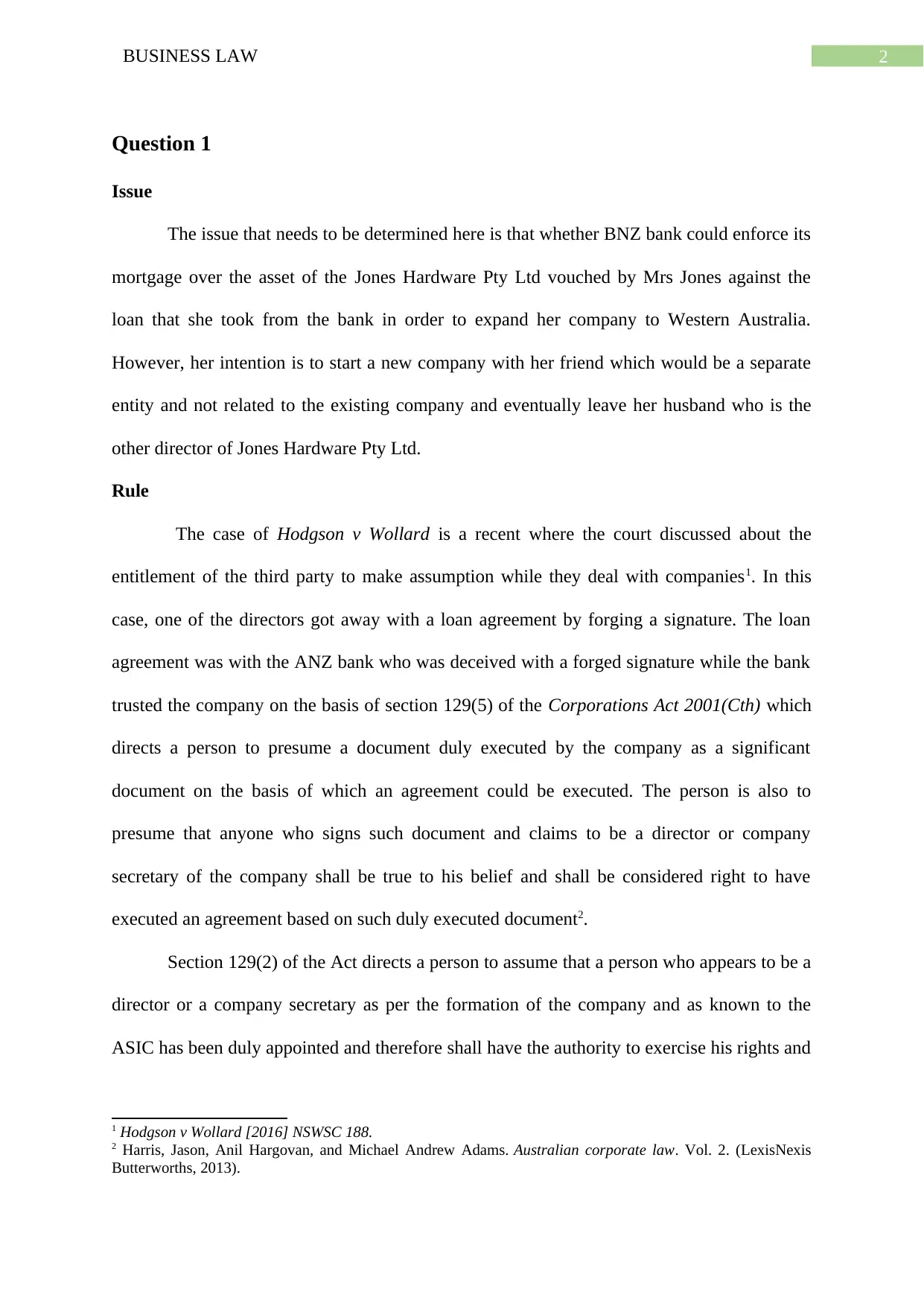
2BUSINESS LAW
Question 1
Issue
The issue that needs to be determined here is that whether BNZ bank could enforce its
mortgage over the asset of the Jones Hardware Pty Ltd vouched by Mrs Jones against the
loan that she took from the bank in order to expand her company to Western Australia.
However, her intention is to start a new company with her friend which would be a separate
entity and not related to the existing company and eventually leave her husband who is the
other director of Jones Hardware Pty Ltd.
Rule
The case of Hodgson v Wollard is a recent where the court discussed about the
entitlement of the third party to make assumption while they deal with companies1. In this
case, one of the directors got away with a loan agreement by forging a signature. The loan
agreement was with the ANZ bank who was deceived with a forged signature while the bank
trusted the company on the basis of section 129(5) of the Corporations Act 2001(Cth) which
directs a person to presume a document duly executed by the company as a significant
document on the basis of which an agreement could be executed. The person is also to
presume that anyone who signs such document and claims to be a director or company
secretary of the company shall be true to his belief and shall be considered right to have
executed an agreement based on such duly executed document2.
Section 129(2) of the Act directs a person to assume that a person who appears to be a
director or a company secretary as per the formation of the company and as known to the
ASIC has been duly appointed and therefore shall have the authority to exercise his rights and
1 Hodgson v Wollard [2016] NSWSC 188.
2 Harris, Jason, Anil Hargovan, and Michael Andrew Adams. Australian corporate law. Vol. 2. (LexisNexis
Butterworths, 2013).
Question 1
Issue
The issue that needs to be determined here is that whether BNZ bank could enforce its
mortgage over the asset of the Jones Hardware Pty Ltd vouched by Mrs Jones against the
loan that she took from the bank in order to expand her company to Western Australia.
However, her intention is to start a new company with her friend which would be a separate
entity and not related to the existing company and eventually leave her husband who is the
other director of Jones Hardware Pty Ltd.
Rule
The case of Hodgson v Wollard is a recent where the court discussed about the
entitlement of the third party to make assumption while they deal with companies1. In this
case, one of the directors got away with a loan agreement by forging a signature. The loan
agreement was with the ANZ bank who was deceived with a forged signature while the bank
trusted the company on the basis of section 129(5) of the Corporations Act 2001(Cth) which
directs a person to presume a document duly executed by the company as a significant
document on the basis of which an agreement could be executed. The person is also to
presume that anyone who signs such document and claims to be a director or company
secretary of the company shall be true to his belief and shall be considered right to have
executed an agreement based on such duly executed document2.
Section 129(2) of the Act directs a person to assume that a person who appears to be a
director or a company secretary as per the formation of the company and as known to the
ASIC has been duly appointed and therefore shall have the authority to exercise his rights and
1 Hodgson v Wollard [2016] NSWSC 188.
2 Harris, Jason, Anil Hargovan, and Michael Andrew Adams. Australian corporate law. Vol. 2. (LexisNexis
Butterworths, 2013).
⊘ This is a preview!⊘
Do you want full access?
Subscribe today to unlock all pages.

Trusted by 1+ million students worldwide
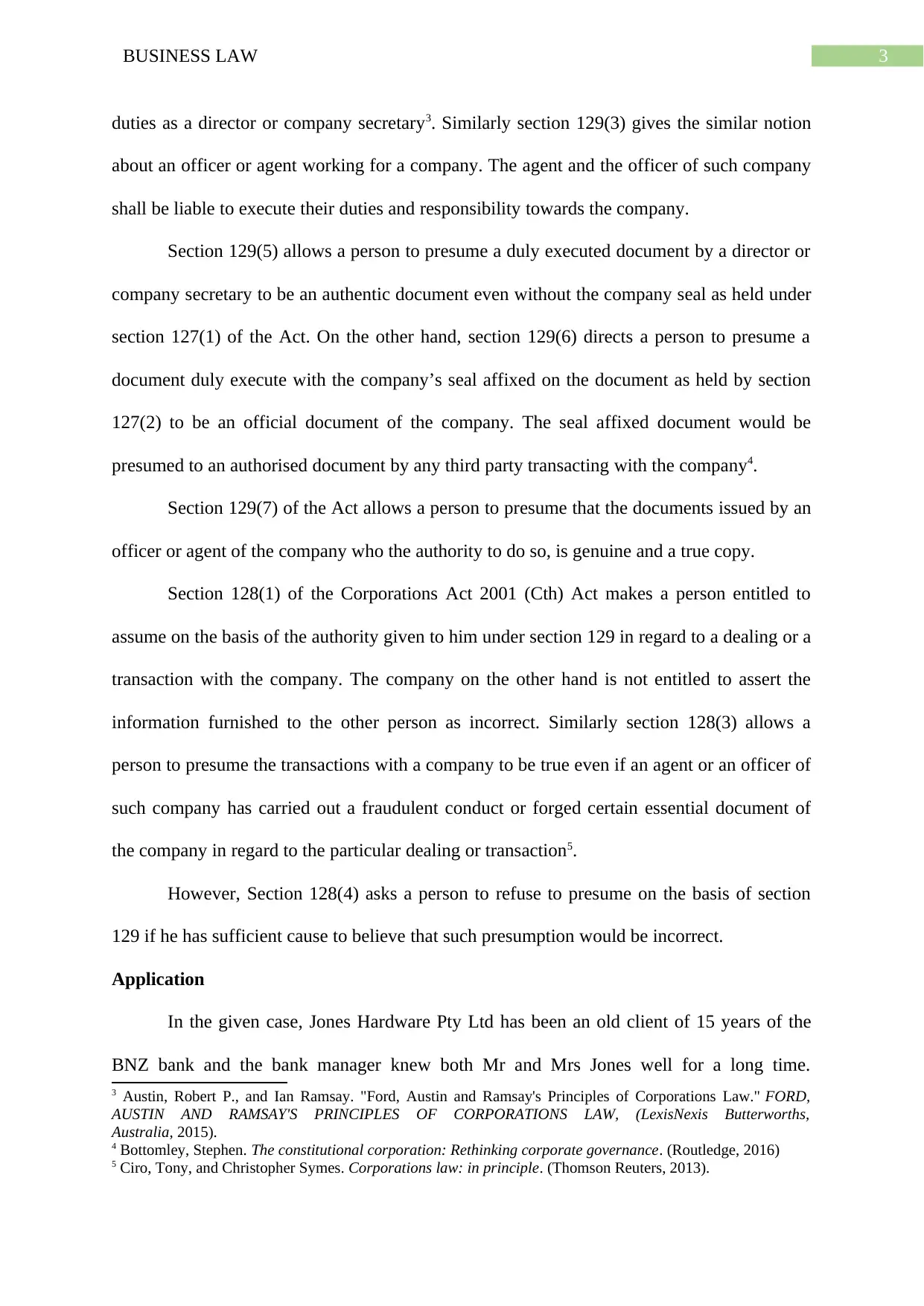
3BUSINESS LAW
duties as a director or company secretary3. Similarly section 129(3) gives the similar notion
about an officer or agent working for a company. The agent and the officer of such company
shall be liable to execute their duties and responsibility towards the company.
Section 129(5) allows a person to presume a duly executed document by a director or
company secretary to be an authentic document even without the company seal as held under
section 127(1) of the Act. On the other hand, section 129(6) directs a person to presume a
document duly execute with the company’s seal affixed on the document as held by section
127(2) to be an official document of the company. The seal affixed document would be
presumed to an authorised document by any third party transacting with the company4.
Section 129(7) of the Act allows a person to presume that the documents issued by an
officer or agent of the company who the authority to do so, is genuine and a true copy.
Section 128(1) of the Corporations Act 2001 (Cth) Act makes a person entitled to
assume on the basis of the authority given to him under section 129 in regard to a dealing or a
transaction with the company. The company on the other hand is not entitled to assert the
information furnished to the other person as incorrect. Similarly section 128(3) allows a
person to presume the transactions with a company to be true even if an agent or an officer of
such company has carried out a fraudulent conduct or forged certain essential document of
the company in regard to the particular dealing or transaction5.
However, Section 128(4) asks a person to refuse to presume on the basis of section
129 if he has sufficient cause to believe that such presumption would be incorrect.
Application
In the given case, Jones Hardware Pty Ltd has been an old client of 15 years of the
BNZ bank and the bank manager knew both Mr and Mrs Jones well for a long time.
3 Austin, Robert P., and Ian Ramsay. "Ford, Austin and Ramsay's Principles of Corporations Law." FORD,
AUSTIN AND RAMSAY'S PRINCIPLES OF CORPORATIONS LAW, (LexisNexis Butterworths,
Australia, 2015).
4 Bottomley, Stephen. The constitutional corporation: Rethinking corporate governance. (Routledge, 2016)
5 Ciro, Tony, and Christopher Symes. Corporations law: in principle. (Thomson Reuters, 2013).
duties as a director or company secretary3. Similarly section 129(3) gives the similar notion
about an officer or agent working for a company. The agent and the officer of such company
shall be liable to execute their duties and responsibility towards the company.
Section 129(5) allows a person to presume a duly executed document by a director or
company secretary to be an authentic document even without the company seal as held under
section 127(1) of the Act. On the other hand, section 129(6) directs a person to presume a
document duly execute with the company’s seal affixed on the document as held by section
127(2) to be an official document of the company. The seal affixed document would be
presumed to an authorised document by any third party transacting with the company4.
Section 129(7) of the Act allows a person to presume that the documents issued by an
officer or agent of the company who the authority to do so, is genuine and a true copy.
Section 128(1) of the Corporations Act 2001 (Cth) Act makes a person entitled to
assume on the basis of the authority given to him under section 129 in regard to a dealing or a
transaction with the company. The company on the other hand is not entitled to assert the
information furnished to the other person as incorrect. Similarly section 128(3) allows a
person to presume the transactions with a company to be true even if an agent or an officer of
such company has carried out a fraudulent conduct or forged certain essential document of
the company in regard to the particular dealing or transaction5.
However, Section 128(4) asks a person to refuse to presume on the basis of section
129 if he has sufficient cause to believe that such presumption would be incorrect.
Application
In the given case, Jones Hardware Pty Ltd has been an old client of 15 years of the
BNZ bank and the bank manager knew both Mr and Mrs Jones well for a long time.
3 Austin, Robert P., and Ian Ramsay. "Ford, Austin and Ramsay's Principles of Corporations Law." FORD,
AUSTIN AND RAMSAY'S PRINCIPLES OF CORPORATIONS LAW, (LexisNexis Butterworths,
Australia, 2015).
4 Bottomley, Stephen. The constitutional corporation: Rethinking corporate governance. (Routledge, 2016)
5 Ciro, Tony, and Christopher Symes. Corporations law: in principle. (Thomson Reuters, 2013).
Paraphrase This Document
Need a fresh take? Get an instant paraphrase of this document with our AI Paraphraser
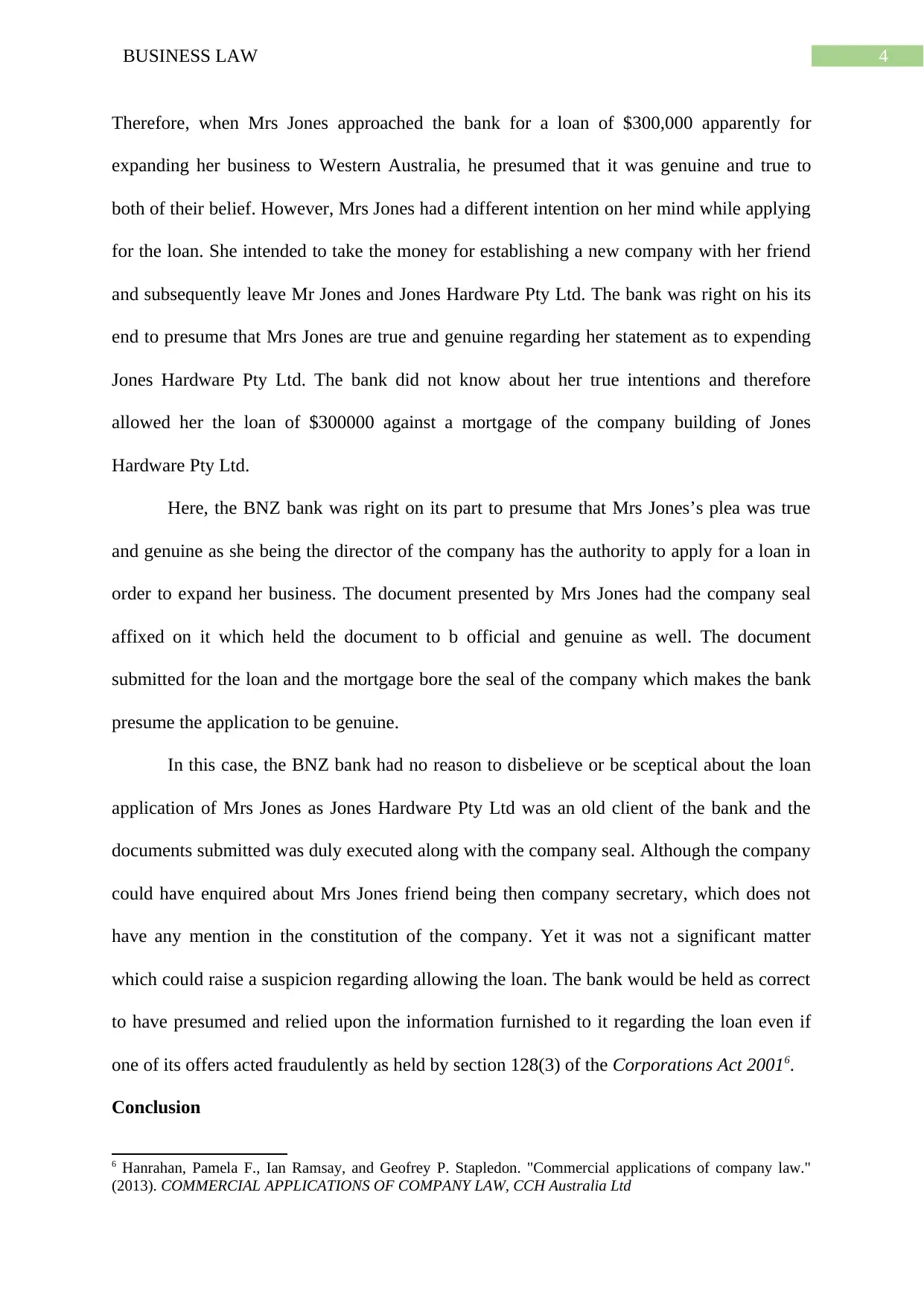
4BUSINESS LAW
Therefore, when Mrs Jones approached the bank for a loan of $300,000 apparently for
expanding her business to Western Australia, he presumed that it was genuine and true to
both of their belief. However, Mrs Jones had a different intention on her mind while applying
for the loan. She intended to take the money for establishing a new company with her friend
and subsequently leave Mr Jones and Jones Hardware Pty Ltd. The bank was right on his its
end to presume that Mrs Jones are true and genuine regarding her statement as to expending
Jones Hardware Pty Ltd. The bank did not know about her true intentions and therefore
allowed her the loan of $300000 against a mortgage of the company building of Jones
Hardware Pty Ltd.
Here, the BNZ bank was right on its part to presume that Mrs Jones’s plea was true
and genuine as she being the director of the company has the authority to apply for a loan in
order to expand her business. The document presented by Mrs Jones had the company seal
affixed on it which held the document to b official and genuine as well. The document
submitted for the loan and the mortgage bore the seal of the company which makes the bank
presume the application to be genuine.
In this case, the BNZ bank had no reason to disbelieve or be sceptical about the loan
application of Mrs Jones as Jones Hardware Pty Ltd was an old client of the bank and the
documents submitted was duly executed along with the company seal. Although the company
could have enquired about Mrs Jones friend being then company secretary, which does not
have any mention in the constitution of the company. Yet it was not a significant matter
which could raise a suspicion regarding allowing the loan. The bank would be held as correct
to have presumed and relied upon the information furnished to it regarding the loan even if
one of its offers acted fraudulently as held by section 128(3) of the Corporations Act 20016.
Conclusion
6 Hanrahan, Pamela F., Ian Ramsay, and Geofrey P. Stapledon. "Commercial applications of company law."
(2013). COMMERCIAL APPLICATIONS OF COMPANY LAW, CCH Australia Ltd
Therefore, when Mrs Jones approached the bank for a loan of $300,000 apparently for
expanding her business to Western Australia, he presumed that it was genuine and true to
both of their belief. However, Mrs Jones had a different intention on her mind while applying
for the loan. She intended to take the money for establishing a new company with her friend
and subsequently leave Mr Jones and Jones Hardware Pty Ltd. The bank was right on his its
end to presume that Mrs Jones are true and genuine regarding her statement as to expending
Jones Hardware Pty Ltd. The bank did not know about her true intentions and therefore
allowed her the loan of $300000 against a mortgage of the company building of Jones
Hardware Pty Ltd.
Here, the BNZ bank was right on its part to presume that Mrs Jones’s plea was true
and genuine as she being the director of the company has the authority to apply for a loan in
order to expand her business. The document presented by Mrs Jones had the company seal
affixed on it which held the document to b official and genuine as well. The document
submitted for the loan and the mortgage bore the seal of the company which makes the bank
presume the application to be genuine.
In this case, the BNZ bank had no reason to disbelieve or be sceptical about the loan
application of Mrs Jones as Jones Hardware Pty Ltd was an old client of the bank and the
documents submitted was duly executed along with the company seal. Although the company
could have enquired about Mrs Jones friend being then company secretary, which does not
have any mention in the constitution of the company. Yet it was not a significant matter
which could raise a suspicion regarding allowing the loan. The bank would be held as correct
to have presumed and relied upon the information furnished to it regarding the loan even if
one of its offers acted fraudulently as held by section 128(3) of the Corporations Act 20016.
Conclusion
6 Hanrahan, Pamela F., Ian Ramsay, and Geofrey P. Stapledon. "Commercial applications of company law."
(2013). COMMERCIAL APPLICATIONS OF COMPANY LAW, CCH Australia Ltd
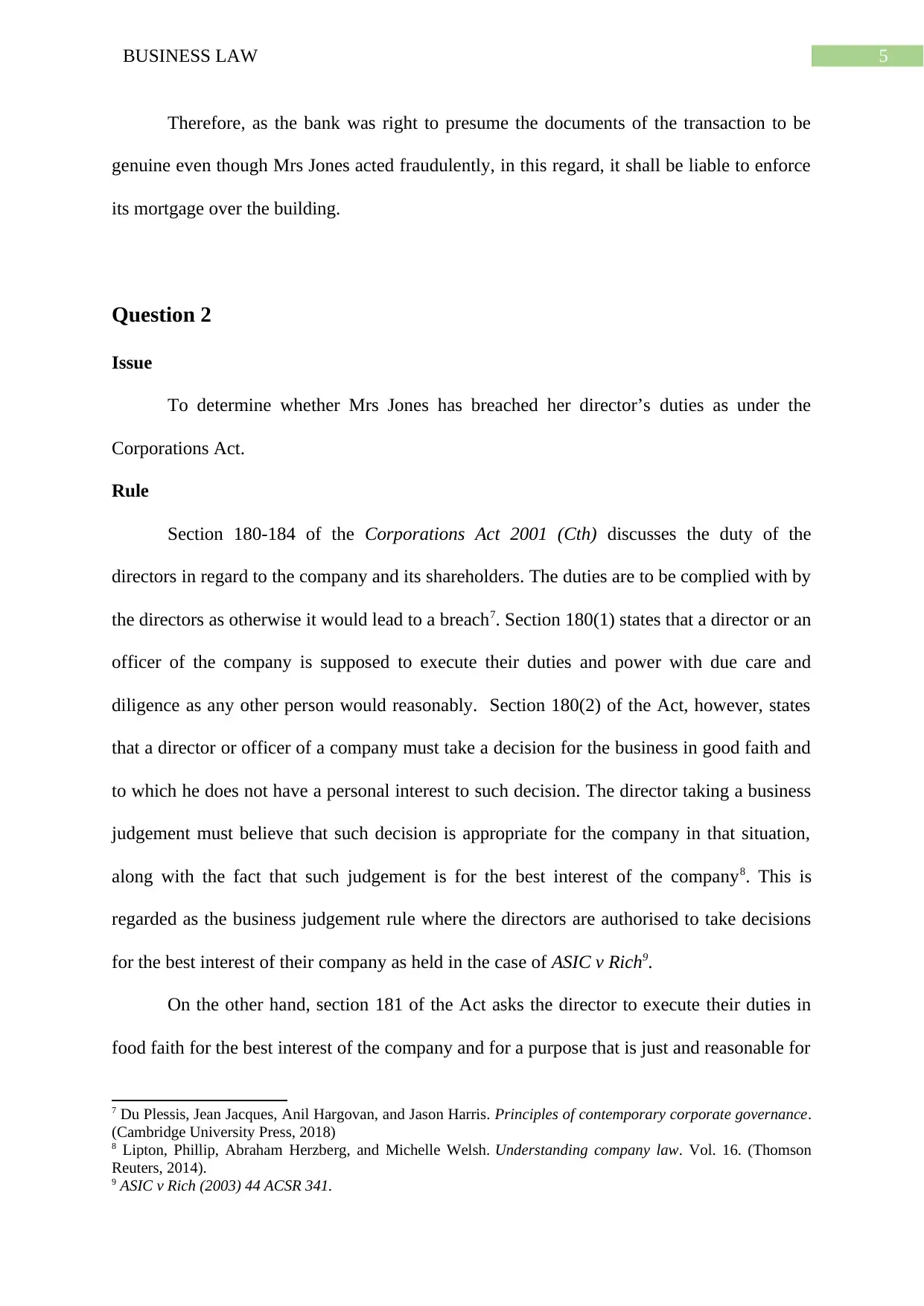
5BUSINESS LAW
Therefore, as the bank was right to presume the documents of the transaction to be
genuine even though Mrs Jones acted fraudulently, in this regard, it shall be liable to enforce
its mortgage over the building.
Question 2
Issue
To determine whether Mrs Jones has breached her director’s duties as under the
Corporations Act.
Rule
Section 180-184 of the Corporations Act 2001 (Cth) discusses the duty of the
directors in regard to the company and its shareholders. The duties are to be complied with by
the directors as otherwise it would lead to a breach7. Section 180(1) states that a director or an
officer of the company is supposed to execute their duties and power with due care and
diligence as any other person would reasonably. Section 180(2) of the Act, however, states
that a director or officer of a company must take a decision for the business in good faith and
to which he does not have a personal interest to such decision. The director taking a business
judgement must believe that such decision is appropriate for the company in that situation,
along with the fact that such judgement is for the best interest of the company8. This is
regarded as the business judgement rule where the directors are authorised to take decisions
for the best interest of their company as held in the case of ASIC v Rich9.
On the other hand, section 181 of the Act asks the director to execute their duties in
food faith for the best interest of the company and for a purpose that is just and reasonable for
7 Du Plessis, Jean Jacques, Anil Hargovan, and Jason Harris. Principles of contemporary corporate governance.
(Cambridge University Press, 2018)
8 Lipton, Phillip, Abraham Herzberg, and Michelle Welsh. Understanding company law. Vol. 16. (Thomson
Reuters, 2014).
9 ASIC v Rich (2003) 44 ACSR 341.
Therefore, as the bank was right to presume the documents of the transaction to be
genuine even though Mrs Jones acted fraudulently, in this regard, it shall be liable to enforce
its mortgage over the building.
Question 2
Issue
To determine whether Mrs Jones has breached her director’s duties as under the
Corporations Act.
Rule
Section 180-184 of the Corporations Act 2001 (Cth) discusses the duty of the
directors in regard to the company and its shareholders. The duties are to be complied with by
the directors as otherwise it would lead to a breach7. Section 180(1) states that a director or an
officer of the company is supposed to execute their duties and power with due care and
diligence as any other person would reasonably. Section 180(2) of the Act, however, states
that a director or officer of a company must take a decision for the business in good faith and
to which he does not have a personal interest to such decision. The director taking a business
judgement must believe that such decision is appropriate for the company in that situation,
along with the fact that such judgement is for the best interest of the company8. This is
regarded as the business judgement rule where the directors are authorised to take decisions
for the best interest of their company as held in the case of ASIC v Rich9.
On the other hand, section 181 of the Act asks the director to execute their duties in
food faith for the best interest of the company and for a purpose that is just and reasonable for
7 Du Plessis, Jean Jacques, Anil Hargovan, and Jason Harris. Principles of contemporary corporate governance.
(Cambridge University Press, 2018)
8 Lipton, Phillip, Abraham Herzberg, and Michelle Welsh. Understanding company law. Vol. 16. (Thomson
Reuters, 2014).
9 ASIC v Rich (2003) 44 ACSR 341.
⊘ This is a preview!⊘
Do you want full access?
Subscribe today to unlock all pages.

Trusted by 1+ million students worldwide
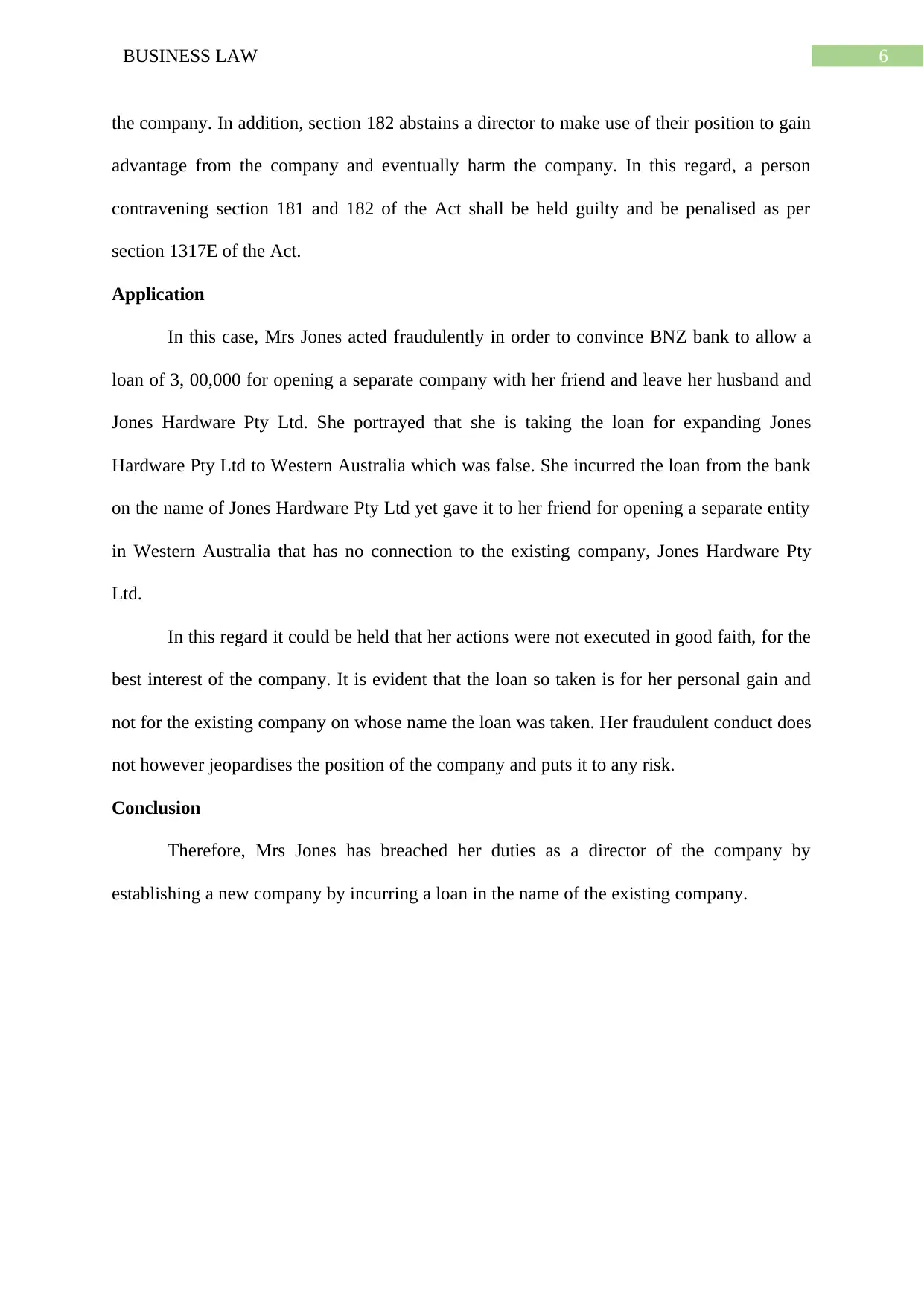
6BUSINESS LAW
the company. In addition, section 182 abstains a director to make use of their position to gain
advantage from the company and eventually harm the company. In this regard, a person
contravening section 181 and 182 of the Act shall be held guilty and be penalised as per
section 1317E of the Act.
Application
In this case, Mrs Jones acted fraudulently in order to convince BNZ bank to allow a
loan of 3, 00,000 for opening a separate company with her friend and leave her husband and
Jones Hardware Pty Ltd. She portrayed that she is taking the loan for expanding Jones
Hardware Pty Ltd to Western Australia which was false. She incurred the loan from the bank
on the name of Jones Hardware Pty Ltd yet gave it to her friend for opening a separate entity
in Western Australia that has no connection to the existing company, Jones Hardware Pty
Ltd.
In this regard it could be held that her actions were not executed in good faith, for the
best interest of the company. It is evident that the loan so taken is for her personal gain and
not for the existing company on whose name the loan was taken. Her fraudulent conduct does
not however jeopardises the position of the company and puts it to any risk.
Conclusion
Therefore, Mrs Jones has breached her duties as a director of the company by
establishing a new company by incurring a loan in the name of the existing company.
the company. In addition, section 182 abstains a director to make use of their position to gain
advantage from the company and eventually harm the company. In this regard, a person
contravening section 181 and 182 of the Act shall be held guilty and be penalised as per
section 1317E of the Act.
Application
In this case, Mrs Jones acted fraudulently in order to convince BNZ bank to allow a
loan of 3, 00,000 for opening a separate company with her friend and leave her husband and
Jones Hardware Pty Ltd. She portrayed that she is taking the loan for expanding Jones
Hardware Pty Ltd to Western Australia which was false. She incurred the loan from the bank
on the name of Jones Hardware Pty Ltd yet gave it to her friend for opening a separate entity
in Western Australia that has no connection to the existing company, Jones Hardware Pty
Ltd.
In this regard it could be held that her actions were not executed in good faith, for the
best interest of the company. It is evident that the loan so taken is for her personal gain and
not for the existing company on whose name the loan was taken. Her fraudulent conduct does
not however jeopardises the position of the company and puts it to any risk.
Conclusion
Therefore, Mrs Jones has breached her duties as a director of the company by
establishing a new company by incurring a loan in the name of the existing company.
Paraphrase This Document
Need a fresh take? Get an instant paraphrase of this document with our AI Paraphraser
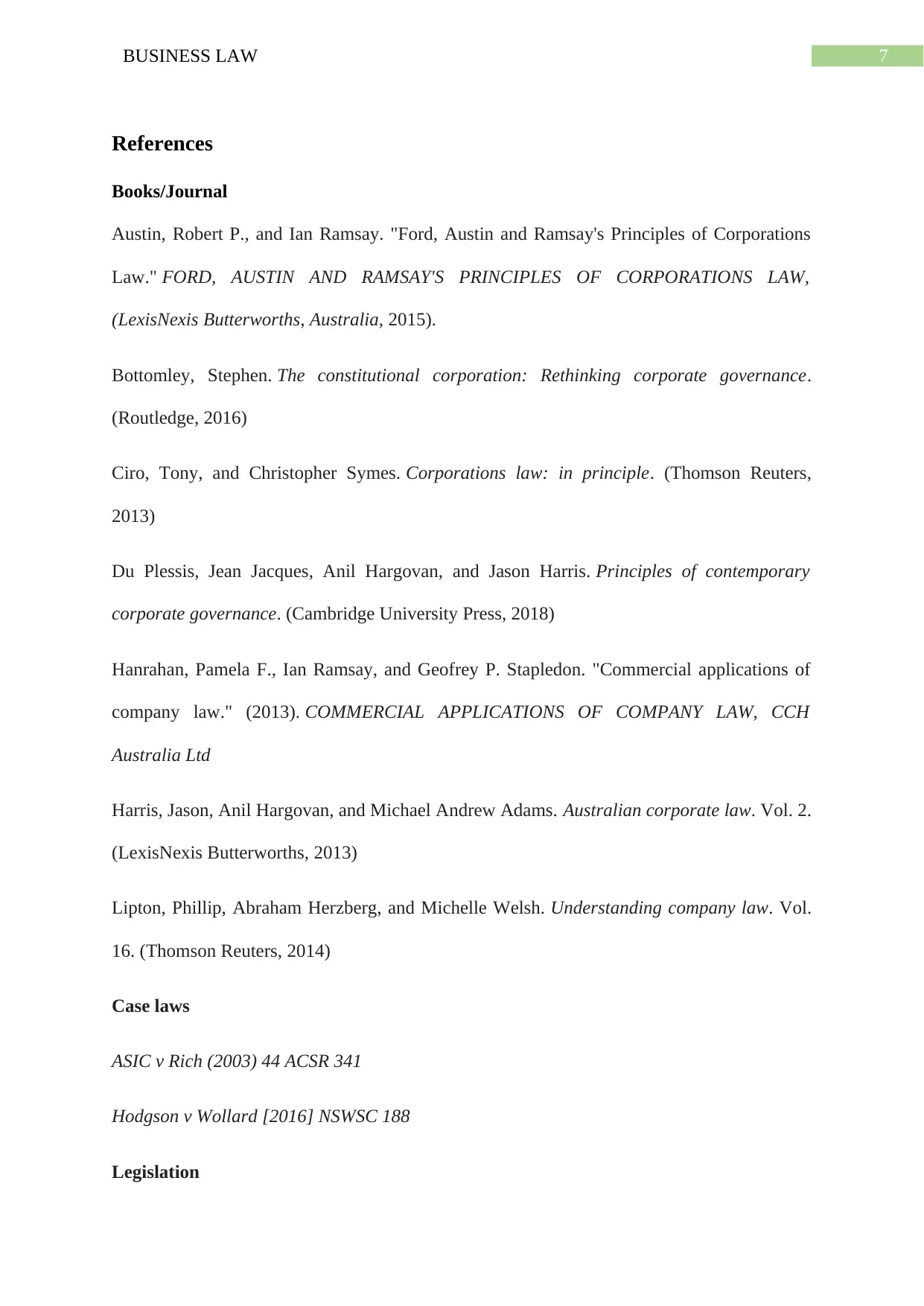
7BUSINESS LAW
References
Books/Journal
Austin, Robert P., and Ian Ramsay. "Ford, Austin and Ramsay's Principles of Corporations
Law." FORD, AUSTIN AND RAMSAY'S PRINCIPLES OF CORPORATIONS LAW,
(LexisNexis Butterworths, Australia, 2015).
Bottomley, Stephen. The constitutional corporation: Rethinking corporate governance.
(Routledge, 2016)
Ciro, Tony, and Christopher Symes. Corporations law: in principle. (Thomson Reuters,
2013)
Du Plessis, Jean Jacques, Anil Hargovan, and Jason Harris. Principles of contemporary
corporate governance. (Cambridge University Press, 2018)
Hanrahan, Pamela F., Ian Ramsay, and Geofrey P. Stapledon. "Commercial applications of
company law." (2013). COMMERCIAL APPLICATIONS OF COMPANY LAW, CCH
Australia Ltd
Harris, Jason, Anil Hargovan, and Michael Andrew Adams. Australian corporate law. Vol. 2.
(LexisNexis Butterworths, 2013)
Lipton, Phillip, Abraham Herzberg, and Michelle Welsh. Understanding company law. Vol.
16. (Thomson Reuters, 2014)
Case laws
ASIC v Rich (2003) 44 ACSR 341
Hodgson v Wollard [2016] NSWSC 188
Legislation
References
Books/Journal
Austin, Robert P., and Ian Ramsay. "Ford, Austin and Ramsay's Principles of Corporations
Law." FORD, AUSTIN AND RAMSAY'S PRINCIPLES OF CORPORATIONS LAW,
(LexisNexis Butterworths, Australia, 2015).
Bottomley, Stephen. The constitutional corporation: Rethinking corporate governance.
(Routledge, 2016)
Ciro, Tony, and Christopher Symes. Corporations law: in principle. (Thomson Reuters,
2013)
Du Plessis, Jean Jacques, Anil Hargovan, and Jason Harris. Principles of contemporary
corporate governance. (Cambridge University Press, 2018)
Hanrahan, Pamela F., Ian Ramsay, and Geofrey P. Stapledon. "Commercial applications of
company law." (2013). COMMERCIAL APPLICATIONS OF COMPANY LAW, CCH
Australia Ltd
Harris, Jason, Anil Hargovan, and Michael Andrew Adams. Australian corporate law. Vol. 2.
(LexisNexis Butterworths, 2013)
Lipton, Phillip, Abraham Herzberg, and Michelle Welsh. Understanding company law. Vol.
16. (Thomson Reuters, 2014)
Case laws
ASIC v Rich (2003) 44 ACSR 341
Hodgson v Wollard [2016] NSWSC 188
Legislation
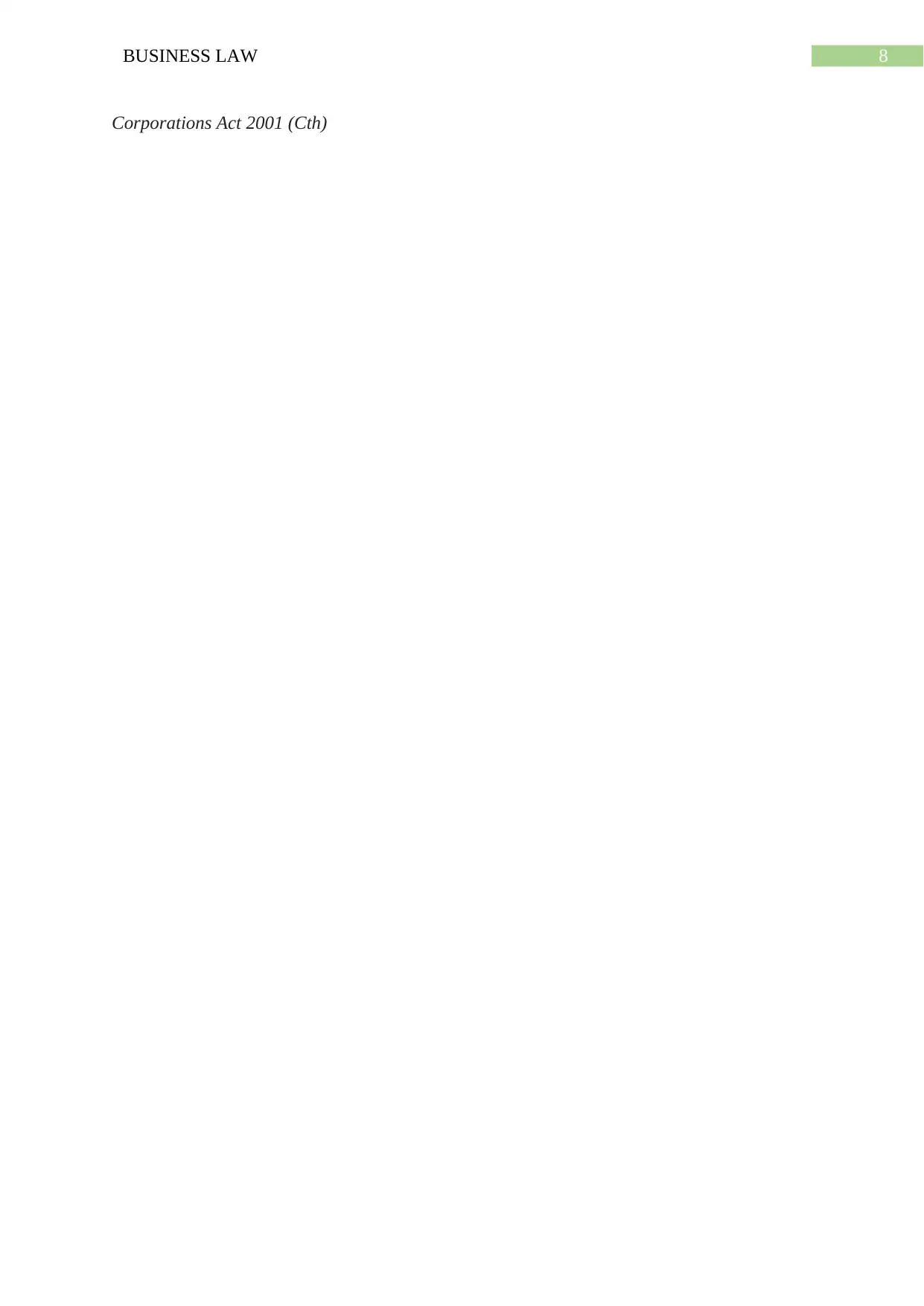
8BUSINESS LAW
Corporations Act 2001 (Cth)
Corporations Act 2001 (Cth)
⊘ This is a preview!⊘
Do you want full access?
Subscribe today to unlock all pages.

Trusted by 1+ million students worldwide
1 out of 9
Related Documents
Your All-in-One AI-Powered Toolkit for Academic Success.
+13062052269
info@desklib.com
Available 24*7 on WhatsApp / Email
![[object Object]](/_next/static/media/star-bottom.7253800d.svg)
Unlock your academic potential
Copyright © 2020–2026 A2Z Services. All Rights Reserved. Developed and managed by ZUCOL.





